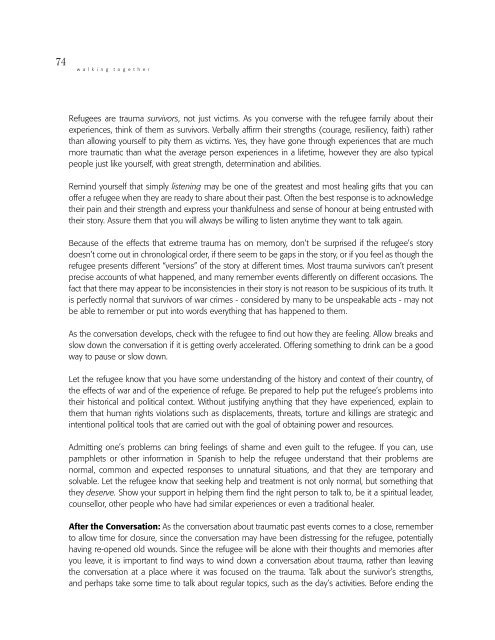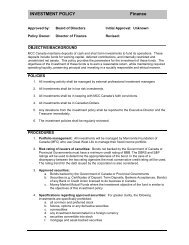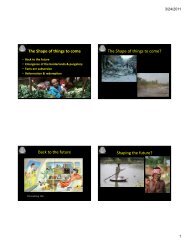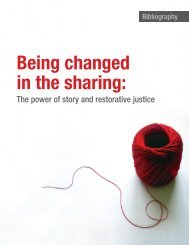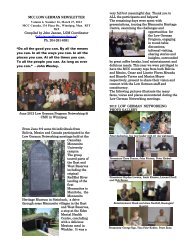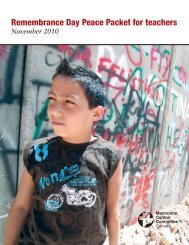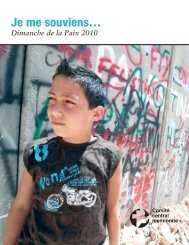Walking together: Healing and hope for Colombian refugees
Walking together: Healing and hope for Colombian refugees
Walking together: Healing and hope for Colombian refugees
You also want an ePaper? Increase the reach of your titles
YUMPU automatically turns print PDFs into web optimized ePapers that Google loves.
74<br />
w a l k i n g<br />
t o g e t h e r<br />
Refugees are trauma survivors, not just victims. As you converse with the refugee family about their<br />
experiences, think of them as survivors. Verbally affirm their strengths (courage, resiliency, faith) rather<br />
than allowing yourself to pity them as victims. Yes, they have gone through experiences that are much<br />
more traumatic than what the average person experiences in a lifetime, however they are also typical<br />
people just like yourself, with great strength, determination <strong>and</strong> abilities.<br />
Remind yourself that simply listening may be one of the greatest <strong>and</strong> most healing gifts that you can<br />
offer a refugee when they are ready to share about their past. Often the best response is to acknowledge<br />
their pain <strong>and</strong> their strength <strong>and</strong> express your thankfulness <strong>and</strong> sense of honour at being entrusted with<br />
their story. Assure them that you will always be willing to listen anytime they want to talk again.<br />
Because of the effects that extreme trauma has on memory, don’t be surprised if the refugee’s story<br />
doesn’t come out in chronological order, if there seem to be gaps in the story, or if you feel as though the<br />
refugee presents different “versions” of the story at different times. Most trauma survivors can’t present<br />
precise accounts of what happened, <strong>and</strong> many remember events differently on different occasions. The<br />
fact that there may appear to be inconsistencies in their story is not reason to be suspicious of its truth. It<br />
is perfectly normal that survivors of war crimes - considered by many to be unspeakable acts - may not<br />
be able to remember or put into words everything that has happened to them.<br />
As the conversation develops, check with the refugee to find out how they are feeling. Allow breaks <strong>and</strong><br />
slow down the conversation if it is getting overly accelerated. Offering something to drink can be a good<br />
way to pause or slow down.<br />
Let the refugee know that you have some underst<strong>and</strong>ing of the history <strong>and</strong> context of their country, of<br />
the effects of war <strong>and</strong> of the experience of refuge. Be prepared to help put the refugee’s problems into<br />
their historical <strong>and</strong> political context. Without justifying anything that they have experienced, explain to<br />
them that human rights violations such as displacements, threats, torture <strong>and</strong> killings are strategic <strong>and</strong><br />
intentional political tools that are carried out with the goal of obtaining power <strong>and</strong> resources.<br />
Admitting one’s problems can bring feelings of shame <strong>and</strong> even guilt to the refugee. If you can, use<br />
pamphlets or other in<strong>for</strong>mation in Spanish to help the refugee underst<strong>and</strong> that their problems are<br />
normal, common <strong>and</strong> expected responses to unnatural situations, <strong>and</strong> that they are temporary <strong>and</strong><br />
solvable. Let the refugee know that seeking help <strong>and</strong> treatment is not only normal, but something that<br />
they deserve. Show your support in helping them find the right person to talk to, be it a spiritual leader,<br />
counsellor, other people who have had similar experiences or even a traditional healer.<br />
After the Conversation: As the conversation about traumatic past events comes to a close, remember<br />
to allow time <strong>for</strong> closure, since the conversation may have been distressing <strong>for</strong> the refugee, potentially<br />
having re-opened old wounds. Since the refugee will be alone with their thoughts <strong>and</strong> memories after<br />
you leave, it is important to find ways to wind down a conversation about trauma, rather than leaving<br />
the conversation at a place where it was focused on the trauma. Talk about the survivor’s strengths,<br />
<strong>and</strong> perhaps take some time to talk about regular topics, such as the day’s activities. Be<strong>for</strong>e ending the


